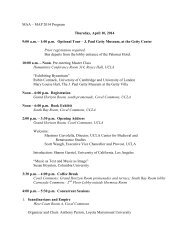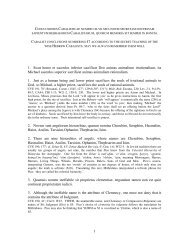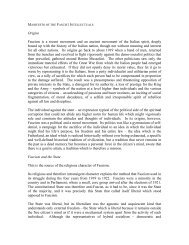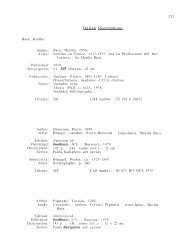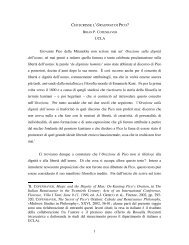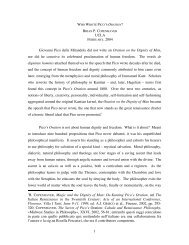1 (1) Pythagoras of Samos instructed the region of Italy once called ...
1 (1) Pythagoras of Samos instructed the region of Italy once called ...
1 (1) Pythagoras of Samos instructed the region of Italy once called ...
You also want an ePaper? Increase the reach of your titles
YUMPU automatically turns print PDFs into web optimized ePapers that Google loves.
In <strong>the</strong> sun is a shimmering (whe<strong>the</strong>r it should be <strong>called</strong> a property or a quality), a power<br />
and, as I would put it, <strong>the</strong> sun’s very life. In <strong>the</strong> sun a light is produced and, in a sense,<br />
born from <strong>the</strong> shimmering. In it is a blaze that spreads and brea<strong>the</strong>s out. I say <strong>the</strong> same<br />
about all fire. (6) I shall not say in accord with this that <strong>the</strong> shimmering and life is like<br />
<strong>the</strong> Fa<strong>the</strong>r, <strong>the</strong> light like <strong>the</strong> Son and <strong>the</strong> blaze like <strong>the</strong> Holy Spirit, or that <strong>the</strong> Fa<strong>the</strong>r is<br />
divine power, <strong>the</strong> Son divine wisdom, <strong>the</strong> Holy Spirit divine love. But I shall add<br />
essence and indeed relate it to <strong>the</strong> Fa<strong>the</strong>r, so that now I may say not ‘<strong>the</strong> sun’s power and<br />
life’ but ‘<strong>the</strong> powerful and living sun’; and <strong>the</strong>n relate essence to <strong>the</strong> Son not as ‘<strong>the</strong> light<br />
<strong>of</strong> <strong>the</strong> sun’ but as ‘<strong>the</strong> luminous sun’; and to <strong>the</strong> Holy Spirit not as ‘<strong>the</strong> blaze <strong>of</strong> <strong>the</strong> sun’<br />
but as ‘<strong>the</strong> blazing sun.’ And <strong>the</strong> Fa<strong>the</strong>r will be ‘powerful and living God,’ <strong>the</strong> Son ‘wise<br />
God’ and <strong>the</strong> Holy Spirit ‘loving God.’<br />
(7) From this it is clear why God is one though God is <strong>called</strong> three, and how God begat<br />
God, as if <strong>the</strong>re were a second God as <strong>the</strong> wicked believe. For even though <strong>the</strong> Fa<strong>the</strong>r<br />
generates light eternally, he still does not generate <strong>the</strong> essence which for him is one in<br />
common with <strong>the</strong> Son and <strong>the</strong> Holy Spirit. (8) And unless I am mistaken, this is why <strong>the</strong><br />
Greeks talked about three hupostaseis, because beyond those three ‘properties’ (if one<br />
must put it this way) <strong>of</strong> <strong>the</strong> Fa<strong>the</strong>r, Son and Holy Spirit lies something substantial that I<br />
name ‘essence,’ assuming that it should be named in this way. 137 And essence is<br />
something in things, an essence that those people sometimes call ‘subject,’ sometimes<br />
‘substrate,’ sometimes ‘matter,’ though I could not really prove it to someone who denied<br />
that it is <strong>the</strong>re. 138 But if it is <strong>the</strong> case that <strong>the</strong> sun is just power, light and heat, likewise<br />
God <strong>the</strong> Fa<strong>the</strong>r will also be <strong>the</strong> power that generates God as light while breathing forth<br />
God as love, who is <strong>the</strong> Holy Spirit.<br />
(9) But perhaps it would have been better if those who do not even know <strong>the</strong> ratio <strong>of</strong> <strong>the</strong><br />
side <strong>of</strong> a square to <strong>the</strong> diameter had avoided this whole discussion <strong>of</strong> matter and form.<br />
And it suits us no better since we find no meaning for such a thing ei<strong>the</strong>r in <strong>the</strong> Old or in<br />
<strong>the</strong> New Testament. Writing about <strong>the</strong> source <strong>of</strong> <strong>the</strong> Nile, Lucan was not <strong>of</strong>f course:<br />
You ask about things that <strong>the</strong> world works to make go, and yet,<br />
whatever cause you say lies in <strong>the</strong>se very numerous channels,<br />
for me it’s always that <strong>the</strong> gods have willed <strong>the</strong>m, far and wide. 139<br />
So <strong>the</strong>n, what God has willed to be hidden, let it be hidden, and let us not be so titanically<br />
rash as Aristotle, who wished to seem ignorant <strong>of</strong> nothing, daring to climb up to heaven<br />
and break in. (10) Enough about this, <strong>the</strong>n: I have touched on <strong>the</strong>se points so that <strong>the</strong><br />
terms ‘substance,’ ‘essence,’ ‘subject’ and ‘matter’ would give no one a chance to<br />
quibble, especially when we speak about God. O<strong>the</strong>r issues we shall pursue later.<br />
137<br />
Zippel cites Basil, De spiritu sancto 38 (PGM 32.150); Camporeale, Valla, pp. 243, 427; Z’s ed., pp.<br />
393, 397.<br />
138<br />
Zippel cites Paul <strong>of</strong> Venice, Lib. met. 1, 32, in Sum. nat. (Venice: 1503, 92-3, 117-18).<br />
139<br />
Zippel cites Luc. Phars. 1.417-9, check trans. ???.<br />
36<br />
2/21/05 9:35 PM 36/44



